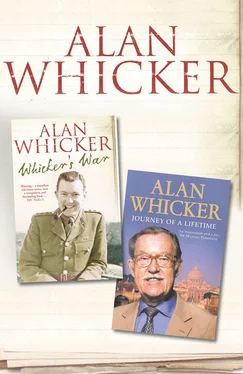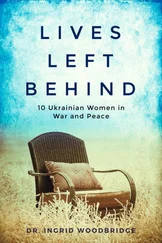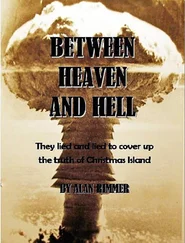The troops roared their welcome. Churchill seemed surprised and delighted at a reception made even more dramatic by perfect Roman acoustics. ‘Get a picture of that,’ he said, spotting me in the stalls busily focusing on him. He waved towards the amphitheatre behind me. ‘Don’t take me – take that.’
I wanted to explain that several of our cameramen were at that moment filming the cheering mass as he stood at its heart, that he was the star and a picture of a lot of soldiers without him was not new or significant … when once more that famous voice ordered, ‘Get a picture of that.’ He was clearly not used to saying things twice – certainly not to young lieutenants. For a moment I wavered. General Anderson, breathing heavily, took a step forward and my court martial flashed before me. ‘Take a picture of that! ’he snapped.
I took a picture of that.
I had to wait until Churchill was well into his panegyric before I could turn and sneak my shot of him amidst his victorious army. Afterwards he walked out to his car, took off his pith helmet and waved it from the top of his stick, gave the V sign and drove away with his Generals. That bit of our war had been won.
There was a brief pause while the armies digested their victory and prepared for the next invasion, and at the beginning of May ’43 our life became almost social. It was spring and, what’s more, we were still alive. We requisitioned a villa at Sidi Bou Saïd, near Carthage. It overlooked the Bay of Tunis and had indoor sanitation, to which we had grown unaccustomed.
My Austin utility was still bent from the weight of jubilant Tunisiennes, so to support our celebrations I had liberated a splendid German staff car, an Opel Kapitan in Wehrmacht camouflage. We were not supposed to use unauthorised transport, so along the German bonnet we craftily painted some imaginary but official-looking numbers – my home telephone number, if you must know.
The start of it all … Directing our first picture sequence in the murky back streets of wartime Holborn, before we sailed for the Mediterranean. This assignment from Pinewood Studios was to film church bells ringing a Victory peal. They were a couple of years early – but it worked out all right in the end …
Ready to go! Identity Card picture.
Invading Italy!
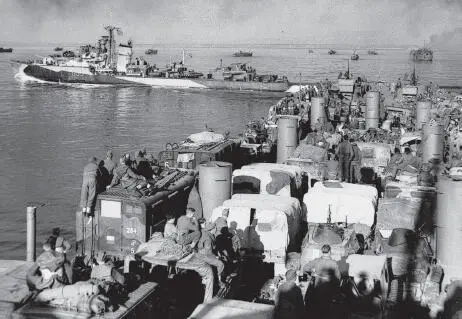
We are shepherded onto the landing beaches by the Royal Navy.
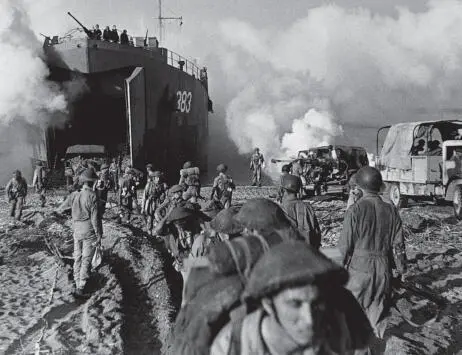
The Landing Ship Tank was the star of every invasion beach around the world …
War! What approaching death must look like to an unlucky soldier: the final German shell explodes …
Infantrymen clear a village, covered by a Bren gunner and a couple of riflemen.
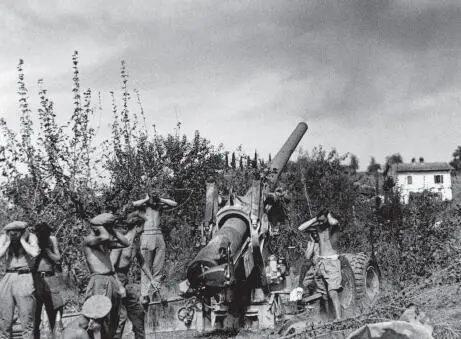
The Royal Artillery’s 155mm gun goes into action.
Throughout the length of Italy German engineers delayed our advance by blowing every bridge in our path.
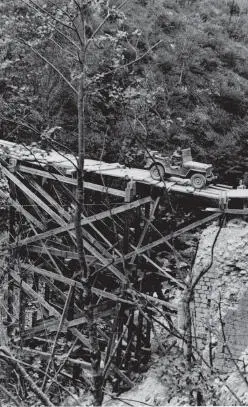
The Royal Engineers’ first solution sometimes looked slightly insecure …
Briefing AFPU cameramen on how we’ll cover the next battle. The regulation De Vry cine-camera, next to water bottle.
Sergeant Radford had been filming a Regiment of Churchill tanks in action. His film stock is replenished …
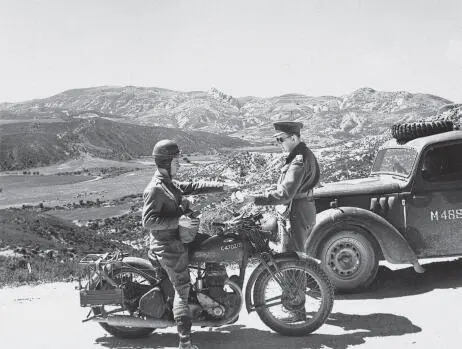
… and the footage he has shot is taken by dispatch rider back to the Developing Section at base.
We were issued with Super Ikontas, inadequate cameras without telephoto lenses.
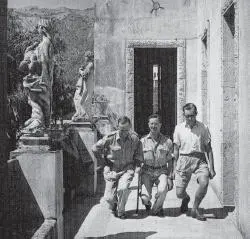
Celebrating our Sicilian victory at Casa Cuseni in Taormina, while awaiting the invasion of Italy. We even had time to perfect the Unit’s ‘Silly Walks’ – some 30 years before Monty Python.
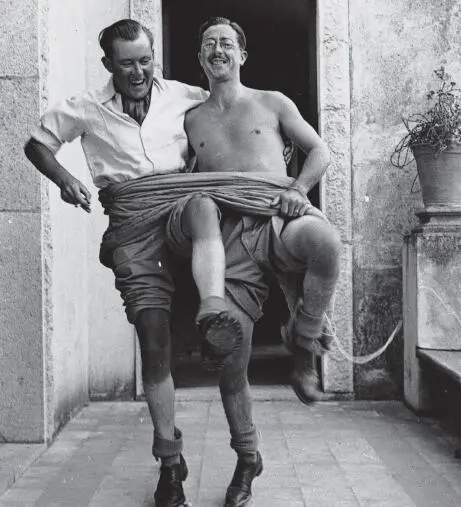
I can’t remember the reason for this outburst of warrior’s relaxation. (It was in the morning, so demon vino was no excuse). Excessive exuberance, perhaps.
The Mess dining room, 60 years ago. Today, unchanged, even the pictures are the same …
… as is the terrace. In those days …
… and now.
I thought we had got away with it until my contraband car was admired at embarrassing length – by King George VI. As I stood to attention before His Majesty, it seemed cruel that the only finger of suspicion should be Regal.
The King had just arrived in Tunis at the start of his Mediterranean tour with Sir James Grigg and Sir Archibald Sinclair. In the welcoming cortège at the airport he spotted my unusual Afrika Korps convertible and pointed it out to General Alexander: ‘That’s a fine car,’ said His Majesty. ‘Very fine.’ The General, compact and elegant, studied it for what seemed a long time. Following his eyeline, all I could see was my phone number growing larger under Royal inspection.
‘Yes Sir,’ he said, finally. ‘A German staff car captured near here by this young officer, I should imagine.’ He gave me a thoughtful look – then they all drove away in a flurry of flags and celebration. I took the phoney car in the opposite direction, quite fast.
It transported me in comfort for some happy weeks until, parked one afternoon outside the office of the Eighth Army News in Tunis it was stolen by – I discovered years later – a brother officer from the Royal Engineers. Stealing captured transport from your own side has to be a war crime.
The King sailed to Malta in the cruiser Aurora , and we scrambled to reach Tripoli by road in time to cover his reception there. The Libyan capital was a cheerless contrast to exuberant Tunis, where they loved us. Streets had to be cleared of sullen Tripolitanians who evidently much preferred Italian occupation. I waited for the arrival ceremony in an open-air café and for the first time heard the wartime anthem ‘Lili Marlene’, played for British officers by a bad-tempered band. It felt strange to be unwelcome – after all, we were liberators.
The immaculate King was greeted by General Montgomery, who as usual dressed down for the occasion: smart casual – shirt, slacks, black Tank Corps beret, long horsehair flywhisk.
Filming with us was our new commanding officer, Major Geoffrey Keating, who became a close friend until his death in 1981. Keating had cut a brave figure in the desert; his photographs and those of his cameramen first made the unusual and unknown Montgomery a national hero. In truth, with high-pitched voice and uneasy birdlike delivery, he was a man with little charm or charisma. He seemed unable to relate to his troops, though on occasion he would try – proffering packets of cigarettes abruptly from his open Humber. However, he was a winner – and because of AFPU was the only publicly recognisable face in the whole Eighth Army.
Читать дальше
